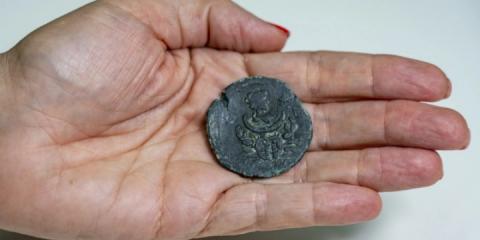Rare Roman era bronze coin found off Israeli coast
One side of the coin displays the figure of the moon goddess, and beneath her, the Cancer zodiac sign, while the other side depicts the head of Roman emperor Antoninus Pius (138–161 CE). Minted in Alexandria, Egypt, and dated “year eight” — the eighth year of Pius’s rule, or 144/145 CE — the coin is part of a series of thirteen, including twelve featuring the different zodiac signs.
“This is the first time such a coin has been discovered off Israel’s coast and it is a rare addition to the National Treasures collection,” said Jacob Sharvit, the IAA’s maritime archaeology unit director. “Israel’s Mediterranean shores and waters have yielded many archaeological sites and finds that attest to connections in antiquity between Mediterranean ports and the countries along it.”
“These finds, which were lost at sea and disappeared from sight for hundreds and thousands of years, have been remarkably well preserved; some are extremely rare and their discovery completes parts of the historical puzzle of the country’s past,” Sharvit remarked.
Pius was not a military ruler and his reign was relatively quiet, coming at the height of the Pax Romana, or “Roman peace” era, the IAA said. “During his rule, the empire’s relations with the Jews were greatly improved, the decrees of Hadrian were revoked, and Jews were allowed to practice circumcision,” the IAA elaborated. “These steps led to amicable relations between the emperor and [the Mishnah-era sage] Rabbi Yehuda ha-Nasi.”
IAA Director, Eli Eskosido, explained that over the past decade, Israel has begun to recognize the full importance of the sea — as “an integral part of it in terms of its cultural heritage, in addition to security considerations and strategic and economic concerns.”
“Israel’s territorial waters contain natural resources and cultural assets that must be explored and protected in light of different interests and potential development,” Eskosido emphasized. “The rare coin recovered during the survey is a vivid reminder of the importance of the survey.”
Sharon Wrobel

